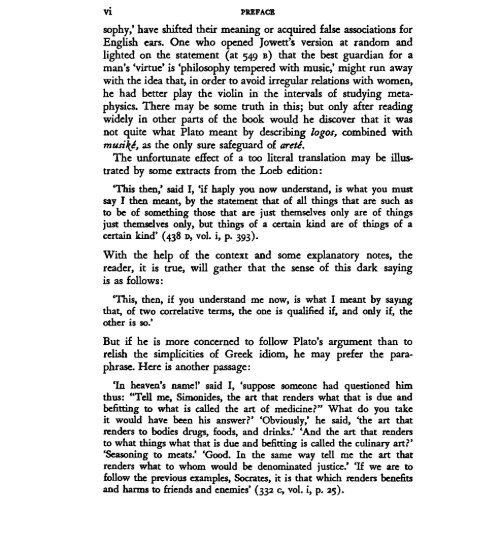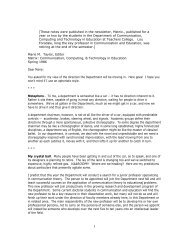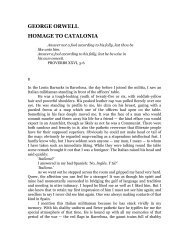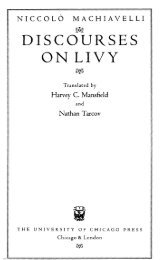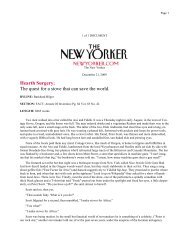THE REPUBLIC OF PLATO - Studyplace
THE REPUBLIC OF PLATO - Studyplace
THE REPUBLIC OF PLATO - Studyplace
You also want an ePaper? Increase the reach of your titles
YUMPU automatically turns print PDFs into web optimized ePapers that Google loves.
vi<br />
PREFACE<br />
sophy,' have shifted their meaning or acquired false associations for<br />
English ears. One who opened Jowett's version at random and<br />
lighted on the statement (at 549 B) that the best guardian for a<br />
man's 'virtue' is 'philosophy tempered with music,' might run away<br />
with the idea that, in order to avoid irregular relations with women,<br />
he had better play the violin in the intervals of studying metaphysics.<br />
There may be some truth in this; but only after reading<br />
widely in other parts of the book would he discover that it was<br />
not quite what Plato meant by describing logos, combined with<br />
musi/{e, as the only sure safeguard of arete.<br />
The unfortunate effect of a too literal translation may be illustrated<br />
by some extracts from the Loeb edition:<br />
'This then,' said I, 'if haply you now understand, is what you must<br />
say I then meant, by the statement that of all things that are such as<br />
to be of something those that are just themselves only are of things<br />
just themselves only, but things of a certain kind are of things of a<br />
certain kind' (438 D, vol. i, p. 393).<br />
With the help of the context and some explanatory notes, the<br />
reader, it is true, will gather that the sense of this dark saying<br />
is as follows:<br />
'This, then, if you understand me now, is what I meant by saymg<br />
that, of two correlative terms, the one is qualified if, and only if, the<br />
other is SKJ.'<br />
But if he is more concerned to follow Plato's argument than to<br />
relish the simplicities of Greek idiom, he may prefer the paraphrase.<br />
Here is another passage:<br />
'In heaven's nameI' said I, 'suppose SKJmeone had questioned him<br />
thus: "Tell me, Simonides, the art that renders what that is due and<br />
befitting to what is called the art of medicine" What do you take<br />
it would have been his answer' 'Obviously,' he said, 'the art that<br />
renders to bodies drugs, foods, and drinks.' 'And the art that renders<br />
to what things what that is due and befitting is called the culinary art'<br />
'SeaSKJning to meats.' 'Good. In the same way tell me the art that<br />
renders what to whom would be denominated justice.' 'If we are to<br />
follow the previous examples, Socrates, it is that which renders benefits<br />
and harms to friends and enemies' (332 c, vol. i, p. 25).


